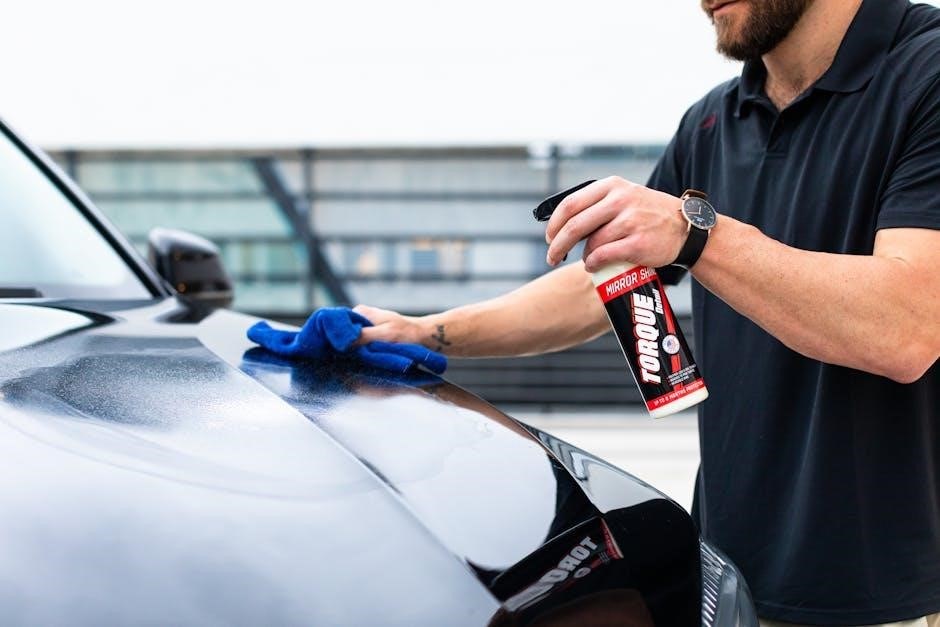Regular maintenance is essential for the 2019 Toyota 4Runner to ensure optimal performance, reliability, and longevity. The maintenance schedule, outlined in the owner’s manual and warranty guide, includes intervals at 5,000, 15,000, and 30,000 miles. Adhering to these intervals ensures your vehicle remains in peak condition.

Understanding the Maintenance Schedule
The 2019 Toyota 4Runner maintenance schedule is designed to keep your vehicle running smoothly, with key services at 5,000, 15,000, and 30,000 miles. These intervals include fluid checks, filter replacements, and inspections of brakes and other critical components to ensure optimal performance and longevity.
2.1. 5,000 Miles Service

The 5,000-mile service is the first major maintenance checkpoint for the 2019 Toyota 4Runner. This interval is crucial for ensuring the vehicle runs smoothly and preventing potential issues. During this service, technicians typically perform an oil and filter change, using Toyota-approved 0W-20 oil for optimal engine performance. Additionally, a tire rotation is recommended to ensure even tread wear and extend the life of the tires. Fluid levels, including coolant, transmission, and brake fluids, are inspected and topped off if necessary. The brakes are also checked for wear, and the battery is tested for proper function. Belts and hoses are visually inspected for signs of damage or wear. This service is a foundational step in maintaining the 4Runner’s reliability and performance. It’s important to follow the recommended schedule to preserve the vehicle’s health and warranty coverage.

2.2. 15,000 Miles Service
The 15,000-mile service for the 2019 Toyota 4Runner is a more comprehensive maintenance checkpoint. At this interval, the transmission and differential fluids are typically replaced to ensure smooth gear shifts and proper all-wheel-drive functionality. Spark plugs are also replaced to maintain optimal engine performance and fuel efficiency. The air filter is inspected and replaced if necessary to improve airflow and engine efficiency. Additionally, the belts and hoses are checked for signs of wear or damage, and the brake system is inspected for proper function; The tire rotation is performed again to ensure even tread wear. This service is critical for maintaining the 4Runner’s versatility and off-road capabilities. It is recommended to follow the schedule outlined in the owner’s manual or warranty guide to ensure the vehicle remains in peak condition. Regular maintenance at this interval helps prevent unexpected repairs and ensures the vehicle operates safely and efficiently.
Oil Change Requirements
Regular oil changes are crucial for maintaining the performance and longevity of the 2019 Toyota 4Runner. The recommended oil type is Toyota 0W-20 or another high-quality 0W-20 motor oil. This viscosity ensures optimal engine lubrication in various temperature conditions. The oil filter, specified as Toyota part 04152-YZZA5, should be replaced during each oil change to maintain filtration efficiency. Oil changes are typically required every 5,000 to 7,500 miles, depending on driving conditions. Synthetic oil is recommended for its superior performance in extreme temperatures and extended drain intervals. Using the correct oil type is essential to prevent engine damage and maintain fuel efficiency. It is also important to avoid using oil additives or non-recommended oils, as they may void the warranty or harm the engine. Always refer to the owner’s manual or consult a certified Toyota service professional for precise recommendations tailored to your driving habits and conditions.
Fluid Checks and Replacements
Regular fluid checks and replacements are vital for the 2019 Toyota 4Runner to ensure proper vehicle operation. The coolant should be inspected every 5,000 miles and replaced every 30,000 to 50,000 miles. Use Toyota Super Long-life Coolant or a non-silicate, non-amine, non-borate ethylene glycol-based OAT coolant low in phosphates. Transmission and differential fluids should be replaced every 15,000 miles or as specified in the maintenance schedule. Brake fluid should be checked every 30,000 miles or when signs of contamination appear. Windshield washer fluid and power steering fluid levels should be monitored regularly and topped off as needed. Always use genuine Toyota fluids or equivalent high-quality alternatives to maintain performance and avoid damage. Refer to the owner’s manual for specific intervals and recommendations tailored to your driving conditions. Proper fluid maintenance ensures optimal performance, prevents corrosion, and extends the lifespan of critical vehicle components. Regular inspections by a certified technician are recommended to identify potential issues early. Adhering to these guidelines helps maintain your Toyota 4Runner’s reliability and performance over time.
Tire Rotation and Inspection
Regular tire rotation and inspection are crucial for maintaining even tread wear, improving traction, and ensuring the longevity of your 2019 Toyota 4Runner’s tires. The recommended tire rotation interval is every 5,000 to 8,000 miles. Use the rearward cross pattern for optimal results. Inspect tires for signs of wear, uneven tread, or damage during each rotation. Check tire pressure monthly, including the spare, and before long trips. Properly inflated tires enhance fuel efficiency and handling. Rotate tires according to the pattern specified in the owner’s manual to maintain balance and performance. Neglecting tire maintenance can lead to uneven wear and reduced safety. Regular inspections help identify issues early, preventing costly repairs. Always refer to the owner’s manual or consult a certified technician for guidance. Consistent tire care ensures your 4Runner remains reliable and performs at its best. Stay proactive with tire maintenance to enjoy a smooth and safe driving experience. Regular checks and rotations are key to extending tire life and overall vehicle performance.

Warranty and Maintenance Guide
The 2019 Toyota 4Runner comes with a comprehensive warranty program designed to protect your investment and ensure long-term reliability. The New Vehicle Limited Warranty provides coverage for 36 months or 36,000 miles, whichever comes first. Additionally, the Toyota Accessory Warranty offers the same 36-month/36,000-mile coverage for accessories installed at the time of purchase. Regular maintenance is crucial to uphold warranty coverage, as neglecting scheduled services may void certain protections.

The maintenance guide outlined in the owner’s manual provides detailed intervals and procedures to follow. Failure to adhere to these recommendations could result in denied warranty claims for related repairs. It’s essential to keep records of all maintenance performed, as they may be required for warranty verification. Toyota’s warranty is designed to cover defects in materials and workmanship, ensuring your vehicle remains in optimal condition.
For non-Toyota parts, the maintenance schedule may differ, and it’s vital to follow the manufacturer’s guidelines to maintain coverage. Always consult the owner’s manual or contact a certified Toyota service center for specific guidance. Proper maintenance not only preserves your warranty but also enhances the overall performance and longevity of your 4Runner.

Service Intervals Beyond 15,000 Miles
Beyond 15,000 miles, the 2019 Toyota 4Runner requires specific services at 30,000 and 60,000 miles. These include replacing the engine air filter, spark plugs, and inspecting belts and hoses. Following these intervals ensures long-term reliability and performance.
7.1. 30,000 Miles Service
The 30,000-mile service for the 2019 Toyota 4Runner is a critical maintenance checkpoint. At this interval, it is recommended to replace the engine air filter to ensure proper airflow and engine performance. Additionally, the spark plugs should be replaced to maintain optimal combustion and prevent misfires. Transmission and differential fluids may also need to be replaced, depending on usage conditions. Inspecting the belts and hoses for signs of wear or cracking is another important step to avoid unexpected breakdowns. Brake pads and rotors should be checked for wear, and tires should be rotated to ensure even tread wear. Furthermore, the suspension and steering components should be inspected for any loose or damaged parts. Following this schedule helps prevent major issues and ensures the vehicle continues to run smoothly. Proper documentation of these services is also essential for maintaining warranty coverage and resale value. Always consult the owner’s manual or a certified Toyota technician for precise guidance tailored to your vehicle’s needs.
7.2. 60,000 Miles Service
The 60,000-mile service for the 2019 Toyota 4Runner is a comprehensive maintenance checkpoint designed to ensure longevity and performance. At this interval, it is recommended to replace the engine coolant with Toyota Super Long-life Coolant or an equivalent non-silicate, non-amine, and non-borate ethylene glycol-based OAT coolant low in phosphates. Additionally, the timing belt should be replaced to prevent potential engine damage from a snapped belt. Drive belts are also inspected for wear or cracks and replaced if necessary. The engine and its components are checked for any signs of wear or leaks, ensuring all parts are in optimal condition. The fuel system is serviced to remove contaminants and ensure proper fuel flow. Brake pads, rotors, and fluid are inspected to maintain safe and reliable braking performance. While these are general recommendations, it is always best to consult the owner’s manual or a certified Toyota technician for personalized advice tailored to your vehicle’s specific needs and history.

Leave a Reply
You must be logged in to post a comment.